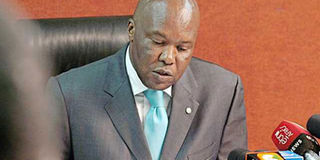By branding suspect ‘woman eater’, Justice Wakiaga walks in footsteps of many others

Justice James Wakiaga at the Milimani Law Courts in Nairobi on Tuesday last week while reading his decision not to release murder suspect Joseph Irungu on bail. PHOTO | DENNIS ONSONGO | NATION MEDIA GROUP
What you need to know:
- The words Justice James Wakiaga used on murder suspect Joseph Irungu may be new but are not outliers in the legal tradition.
There have been arguments and statements of laughter and on occasion supposed outrage that the words were injudicious and had no place within a judicial decision.
When Justice James Wakiaga delivered his ruling on a bail application this week, he may have unleashed different responses from the parties involved in the case. Unquestionably, the judge would have expected as any judicial officer would expect, that there will be those happy at the decision and some irked by it. Naturally, the accused person granted bail by that decision was happy and the one who did not may not have been impressed.
LEXICON
However, for the rest of the public, it is doubtful that the judge could have foreseen the reaction to the ruling in the manner in which it turned out. Justice Wakiaga may have unintentionally introduced a new phrase into the Kenyan lexicon when he used these words: “The pre-bail report of the first accused is that of a male version of “slay queen” which for lack of better terminology I shall call a “woman eater”. There have been arguments and statements of laughter and on occasion supposed outrage that the words were injudicious and had no place within a judicial decision.
LIBELLOUS
But is this outrage justified and was Justice Wakiaga an outlier in the usage of such language in description of a litigant before a judicial officer? Judicial rulings and judgments contain a lot of references to popular culture hence the use of such words as slay queen is not untoward. There are references in law to tests of persons such as “the clapham omnibus passenger” as corollary for a reasonable man in the common law test for negligence or prudent conduct, the “right-thinking member of society” as the measure of whether a statement is libellous.
COLOURFUL
The truth is that judicial decisions and the form of their expression are products of a judge’s social, political and even cultural extraction and I dare say even intellectual aptitude, not to say even subjective views on the parties in dispute.
Those who may be unsettled by the description of the accused person as a “woman eater” may need to look at the words of Justice Megarry in describing a deceased person whose estate was the subject of a dispute before him. The judge said, “Errol Flynn was a film actor whose performances gave pleasure to millions.” The judge went ahead to describe the actor as having led a life which was “full, lusty, restless and colourful”.
HUMOUR
The renowned jurist Lord Denning applied sardonic humour at its best in a judgement. He described a lady who had been married four times at the time of the dispute in court: “I will call her Janet because she has had four surnames already.”
Judgements and rulings also contain statements by judges on the essence of the evidence presented before the court in which the judge is presiding. In Kenya, a Judicial Commission of Inquiry said this of a person: “He has shown conclusively and largely on his own admission to be a perjurer, forger, a fraudster and thief.” This finding on an individuals’ character may only be upended by Justice Quinn in a case decided in Ontario, Canada about one Gurnek Singh. Mr Singh was described as being “unblinkingly dishonest, incorrigible and with no aptitude for the truth”.
CREDIBILITY
Extending this disgust at Mr Singh’s lack of credibility to its limits, the judge said in a footnote to the judgment that he would seek membership of the Flat Earth Society if Mr Singh were to ever claim that the earth was round!
In other words, judges have to use words to describe the issues before them. Take the case of Justice Ward in describing the work of a lap dancer. “The appellant is a lap dancer. I would not begin to know what that involves but could take a guess at it”. He then goes ahead to say that in his understanding, lap dancing is intended to “tease but not satisfy”.
TYPEWRITER
Another judge made a hilarious definition of a typewriter as follows: “For readers under the age of 30 or so, the “typewriter” was a mechanical device used for creating documents that pre-dated the computer and lacked some of the computer’s more annoying characteristics, in particular the computer’s facilitation of “cutting and pasting”, which is undoubtedly one of the four horsemen of the modern apocalypse and which has cost many trees their lives and many lawyers and judges their eyesight.”
CLAIMANT
A judicial decision can also be used to deliver a bouquet of words in expressing pleasure at the actions of parties to a case. An example of approval of a litigant’s stance would be a case where Lord Justice Jacob described Ms Lisa Ferguson, an indefatigable and self-financing public interest litigant in the UK, as follows, “It is one of the glories of this country that every now and then one of its citizens is prepared to take a stand against the big battalions of government and industry. Such a person is Lisa Ferguson, the claimant in this case”.
KINDERGARTEN
On the opposite end, in deprecation of the acts of litigants who were in the judges’ view, acting childish, Judge E. Morgan of Ontario Supreme opined that “The parties do not need a judge; what they need is a rather stern kindergarten teacher”. Justice Morgan explained that this conclusion was arrived at because the parties had continued to act in childish despite manner being very educated professionals and had wasted a whole day in court and hence taxpayers’ money over trifles.
DISSENTING
The barbs and bouquets that judges inject into their decisions are not always intended for the litigants and parties to the disputes. Judges don’t make such pointed statements exclusively at litigants. Sometimes they may make they reserve serrated critique for their colleagues. This can be either on appeal when reversing the decision of a lower court or even when dissenting from each other’s judgments while sitting in the same court.
SUSPICION
The best known in Kenya was by then Court of Appeal Judge Richard Kwach’s statement in dissent from a decision of two other judges in a matter before that court. Justice Kwach pointedly said, “There was a time when this court enjoyed the integrity of Caeser’s wife. It was above suspicion. But that is now water under the bridge. Something has to be done to redeem the reputation and independence of this court.” No prizes for what Justice Kwach thought of his brother judges in that case.
RANCOUR
A competitor on this front would be the Lord Atkin’s statement in a case heard by House of Lords of the United Kingdom in 1941. His undisguised rancour at what he perceived to be weak judges led him to proclaim that the other judges with whom he was sitting in that case were showing themselves more executive minded than the executive. He went on to say that I protest, even if he was alone on doing so.
GOLF CART
There are also instances when judges may express some humour and self-deprecation in their judgments to either express the difficulty of the issue in the case or mere disapproval at the parties for litigating an issue that could be best resolved out of court. In one such case, a professional golf player’s request to the Professional Golf Association to allow him to use a golf-riding cart from hole to hole was declined. His reason for this request was a disease which debilitated his movement. The Golf Association had turned down the request on the basis that it would give the player an unfair advantage against his competition and that walking from one hole to the other was a fundamental component of the sport of golf.
SILLY QUESTION
This dispute went to court and ended up at the US Supreme Court. In his trademarked sarcasm, the late Antonin Scalia said: “It has been rendered the solemn duty of the United States Supreme Court to decide what is golf. The framers of the constitution fully expected that sooner or later the paths of golf and government, the law and the links would cross and that judges of this august court would someday have to wrestle with that age-old jurisprudential question …. Is someone riding around a gold course from shot to shot really a golfer? Either out of humility of out of self-respect (one or the other), the court should decline to answer this incredibly difficult and incredibly silly question.”
LIKABLE
The lawyers representing parties in the case can and often find themselves described within the judgments and rulings by judges. This could be in gratitude by the judges for the industry displayed by the advocates in the case. But judges also speak in when they are unhappy about the professional and ethical lapses of advocates as officers of court. One such case was in Bradshaw — vs- Unity Marine Corporation in the US where the judges said that the advocates though extremely likable lawyers, had together delivered some of the most amateurish pleadings which led the court to surmise that they had entered into a secret pact to draft their pleadings in crayon on the back sides of gravy stained paper mats in the hope that the courts would be so charmed by their childish efforts that the failure to cite any authorities may be unnoticed.
FUNDAMENTAL
But judgments can also contain very poignant statements on the law and to the effects on the litigant in question. One such is my favourite dictum by a judge in Kenya. Chief Justice Madan said this to Stanley Munga Githunguri in 1986:
“Stanley Munga Githunguri! You have been beseeching this Court for Order of Prohibition. Take the Order. This court gives it to you. When you leave here raise your eyes up the hills. Utter a prayer of thankfulness that your fundamental rights are protected under juridical system of Kenya.”
OUTLIERS
In conclusion the words of the judges in cases do not always leave everyone with a grin. Judge Wakiaga is not alone and the words he used in this week may be new but are not outliers in the legal tradition, not just in Kenya but in many other countries.
Mr Owino is the Head of Legal & Training at Nation Media Group.Limited




